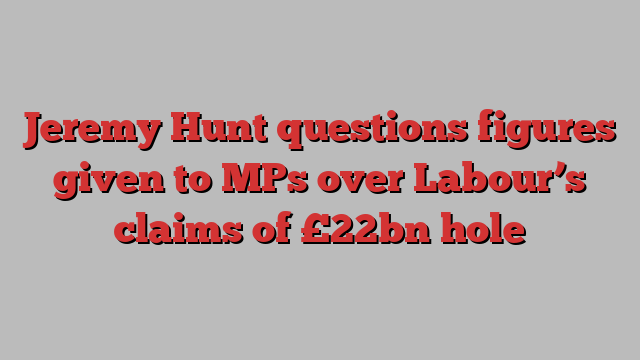
Unlock the Editor’s Digest for free
Roula Khalaf, Editor of the FT, selects her favourite stories in this weekly newsletter.
Jeremy Hunt, shadow chancellor, has written to Britain’s top civil servant raising questions about why MPs were given conflicting information about a £22bn fiscal hole unveiled by Rachel Reeves.
Hunt wrote to Simon Case, cabinet secretary, asking why the figure presented by Reeves on Monday differed markedly from spending estimates provided by the new Labour government to MPs this month.
The Conservatives are determined to challenge the idea that Reeves unearthed a “shocking” fiscal inheritance after she entered the Treasury on July 5 following Labour’s election win.
The chancellor used the apparent discovery of the £22bn hole — much of it created by her £9.4bn decision to approve above-inflation pay rises for public sector workers — to explain a series of “incredibly tough choices”.
They included axing winter fuel payments to 10mn better-off pensioners, scrapping road and rail schemes, reviewing a hospital building programme and the prospect of tax rises and welfare cuts to come.
Hunt wrote to Case pointing out that the £22bn hole outlined in a detailed Treasury audit on Monday was different to the “main estimates” for spending, presented to MPs for their approval on July 17.
He said it was “deeply troubling” that Reeves had made new claims about the public finances that “directly contradict the documents and legislation the government has put before parliament, signed off by senior civil servant accounting officers”.
The former Tory chancellor said the numbers put before MPs this month would all have been signed off by permanent secretaries across Whitehall, including the permanent secretary in the Treasury.
“The chancellor is saying these forecasts of requirements are wrong and therefore senior civil servants are wrong,” Hunt wrote. He claimed Reeves’s audit was a political exercise to pave the way for tax rises at her first Budget on October 30.
“If the estimates are wrong, will accounting officers be sanctioned for signing off departmental spending plans for this year which are based on a forecast of requirements that are wrong?” Hunt asked.
Reeves said an explanation was contained in the footnotes of the new Treasury audit, which said the spending estimates given to MPs this month were prepared before the general election.
“The government was forced to lay them unchanged in order to allow them to be voted on before the summer recess,” the note said. “This was necessary to avoid departments experiencing cash shortages over the summer.”
Reeves told the BBC Today programme on Tuesday: “The previous government should have published the main estimates before the last election. They are normally published in April or May.
“We needed to publish them at the earliest opportunity. We are now updating the house and the country on the true state of our public finances.”
Reeves’s case was bolstered on Monday when Richard Hughes, chair of the independent Office for Budget Responsibility, announced a review into the information he was provided by the last Tory government before he prepared fiscal forecasts alongside Hunt’s last Budget in March.
Hughes said he was only made aware of the extent of in-year spending pressures, including an unfunded £6.4bn bill for housing asylum seekers, “at a meeting with the Treasury last week”. He said there appeared to have been “one of the largest year-ahead overspends” outside the Covid-19 pandemic.
Hunt has noted that £9.4bn of unfunded spending commitments arose from Reeves’s choice to approve in full the recommendations by public sector pay bodies for pay rises of typically 5-6 per cent.
Whitehall departments were only given funding for a 2 per cent rise at the last spending review in 2021.
Reeves also signed off a two-year 22 per cent pay rise for junior doctors, which may see other unions demanding similar treatment in the future.
Among the most controversial elements of Reeves’s plan was the abandonment of a plan to put a lifetime cap on adult social care costs, saving £1.1bn by the end of the 2025-26 fiscal year.
Sir Andrew Dilnot, who has advised successive governments on social care reform, told the BBC the decision was “a tragedy”, adding: “We have to recognise we have failed another generation of families.”
Reeves defended her decision, arguing she had to take tough choices where the previous government had made unfunded commitments. “We’ve inherited a situation I never imagined I would,” she said.